You’re leaving another job interview when the thought hits you: “Should I be sending thank you emails after interviews?”
Absolutely!
But when do you send it?
Who do you send it to? Every interviewer you met or just the hiring manager?
What do you write? How long should it be? How do you strike that delicate balance between interested and desperate?!
Slow down.
Take a breath.
We’re going to answer all of your questions and help you craft a perfect thank you email. We even included 5 email examples for different scenarios to start you off right.
But first, let’s dive into…
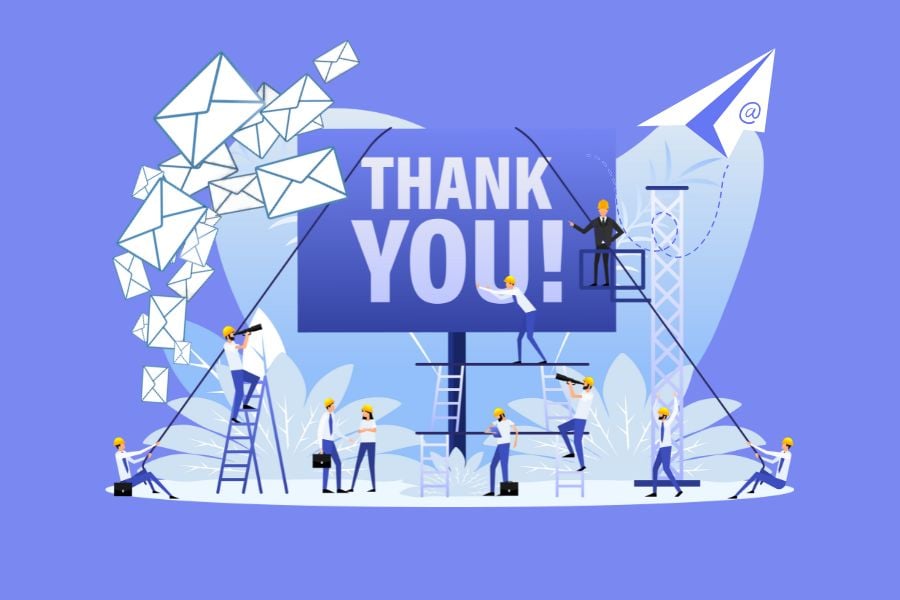
Why You Should ALWAYS Send a Thank You Email After Your Interview
We all know it’s polite to send a thank you email. It will leave the interviewer with a positive impression of you.
But have you considered these other benefits?
It Can Put You Ahead of Your Competition
A report by iCIMS found that:
“63% of recruiters say they would be more likely to hire someone who wanted slightly more money and sent a thank-you note then someone who wanted slightly less money but did not send a thank-you note.”
Yet another survey found that almost 33% of applicants do not send thank you emails after interviews.
Dedicating a little time to this final step of the process could sway the hiring decision in your favor, potentially at the salary you asked for.
It Confirms Your Interest in the Role
Ever left a job interview wondering how it went? Hiring managers could be thinking the same thing. Maybe something changed your mind about the role or company?
Thank you emails are an opportunity for you to reiterate your interest in the position. You can clearly convey to hiring managers that you’re a candidate worth following up with.
It Lets You Demonstrate Your Professional and People Skills
Wouldn’t it be awesome if you could showcase those buzzwords from your resume instead of hoping it all came across in the interview?
Enter the thank you email.
By sending one, you’ll show the recipients that you follow through, that you’re conscientious and polite. You’ll give them a first-hand example of your ability to distill a conversation’s essence into writing.
Most of all, it will let them know that you’re respectful of other people’s time.
Who Should You Email?
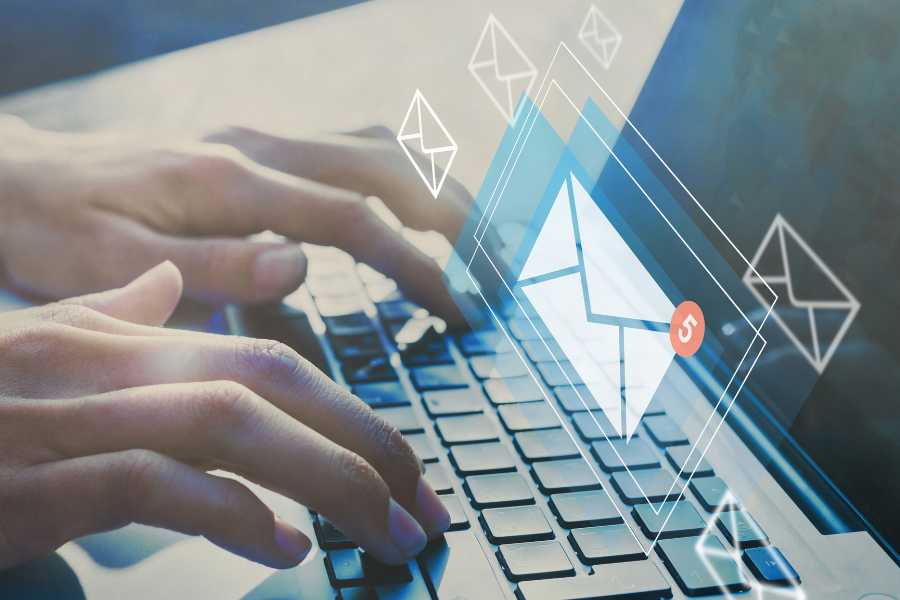
As your interview concludes, be sure to ask the interviewer for their email address. Let them know exactly what it’s for: sending a thank you email. You should do this every time, be it by phone, Zoom, or in person.
And you should send an email after each job interview. A thank you email for a second or third interview will strike a different tone, but it’s still a nice gesture.
If you’re working with a recruiter, consider sending them a thank you email as well, especially if their work leads to a job offer.
A handwritten thank-you letter is nice, too, but it’s slow.
The job market is fast-paced and the benefit of instantaneous email delivery cannot be overstated. If you plan to mail a physical thank you letter, it’s a good idea to use that as a follow-up and send the email first.
How To Write the Perfect Thank You Email
Your thank you email should be concise and genuine. The most effective thank you emails are no more than 3 or 4 paragraphs long and follow these steps:
Write an Informative Subject Line
A simple and straightforward subject line is best — don’t get overly creative here. You want the recipient to immediately know what the email is about.
Some solid subject lines are:
- “Thank you for your time today [or on DATE]”
- “Thank you for the interview for [POSITION] on [DATE]”
- “It was lovely meeting you today”
Trust me, you’ll make your interviewer’s life easier and they’ll appreciate you for it.
Personalize the Greeting
Address the email to the person who interviewed you. If their name is Jonathan, but they introduced themself as Jon, you can use a simple “Hi Jon” for a greeting.
If they introduced themself as Ms. Doe, consider a more formal tone — like “Good evening, Ms. Doe”.
However you address them, be sure to spell their name correctly!
Thank Them for Their Time
It’s a simple sentence, but the impact should not be underrated. Gratitude and an appreciation for someone’s time go a long way.
Attention to the little details, like this one line, will help cultivate their positive impression of you.
Mention Something Specific from Your Interview

Make notes to yourself during the discussion or immediately after. That way, you’ll remember something unique or interesting from the interview.
It may or may not be job-related. Did they mention a favorite coffee shop nearby? Did you bond over your love of dogs?
Referencing back to this moment will not only help them remember you, but you’ll be able to show them that you were actively listening.
Briefly Recap Your Qualifications and Value-Add
Briefly. You don’t need to go over your whole resume again — you already did that in the interview. Choose a few relevant qualifications and connect them to the position you’re interested in.
You want to highlight how your skills will help them resolve pain points and further their business objectives.
This recap will illustrate the value you would provide to them.
Express Your Continued Interest in the Position
The section above does most of the heavy lifting but feel free to add a sentence explicitly stating your interest. Some good examples are:
- “I’m excited about the possibility of joining your [INSERT COMPANY NAME].”
- “If you think we’re a good match, I would enjoy the prospect of working together.”
- “I’m confident I’m a good fit for [JOB TITLE].”
Make sure there’s no doubt in their mind that you want the job.
Offer To Answer Additional Questions
It’s a short, clear sentence that leaves the door open for further communication. Questions are good — it means they’re still thinking about you.
Making this offer shows that you’re proactive and willing to help. And it further signals your readiness to continue with the hiring process.
Start a Dialogue About the Next Steps
Here’s another opportunity to demonstrate your active listening skills! The interview process varies, so craft your call for the next steps to match their specific process.
If they mentioned a second interview, say something like “Please feel free to contact me to arrange the next interview.”
If they didn’t mention what the next steps are, you can ask now. “Please let me know what the next steps are.”
Add Your Signature and Contact Info
Sign off with a positive expression of gratitude. Good choices are:
- “Thank you,” or “Thanks again,”
- “Best,”
- “Sincerely,
If you don’t have a signature set up on your personal email account, be sure to type your full name. Include your contact information below your name so it’s easy for the recipient to find.
Common Mistakes To Avoid
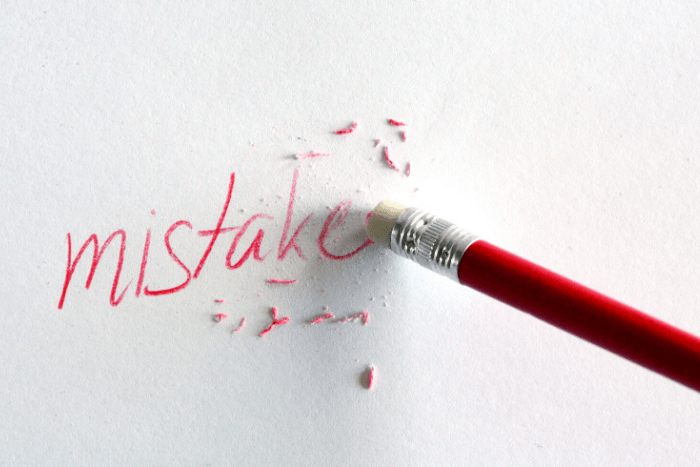
Don’t undermine all the hard work you put into your job search and thank you email by making the following mistakes:
Waiting Too Long To Send Your Email
You should send your thank you email 24 – 48 hours after the interview. Personally, I like to send mine the next business day.
As tempting as it is, you don’t want to send it immediately after the interview. The recipient might think you didn’t take time to personalize it. That’ll work against you.
But say it’s a week later, and you forgot to send a thank you email. Still send one! A late thank you is better than no thank you at all.
Sending a Form Email to Multiple People
If there were multiple interviewers, avoid the impulse to put everyone on the same thread. Each person deserves their own thank you email after an interview — and everyone deserves a bit of personalization.
If you send identical emails to all your interviewers, it stops being a grateful note and becomes just a task to check off.
That’s not the message you want to send, is it?
Making Requests or Including Too Much Detail
Don’t take up too much of their time with your thank you email. These are kind notes of appreciation. They’re meant to be short. You don’t need to go over every little thing you discussed in the interview.
Don’t use them as a chance to ask questions you forgot to ask in the interview, either.
You don’t want to create more work for the interviewer — you want to project an air of someone who is easy to work with.
Not Proofreading
Before you hit send on that email, make sure to proofread it! You want to look out for spelling and basic grammatical errors. A thank you email full of errors looks sloppy and rushed — and makes you look sloppy, too.
This is also a good time to be sure you spelled the recipient’s name right.
5 Thank You Email Examples
Below are 5 different scenarios and an appropriate thank you email so you don’t have to start from scratch.
The Classic Thank You Email
This style can be adapted for just about any situation. A lot of the tactics from above can be seen in action, but most notable are expressing continued interest and mentioning something specific from the interview.
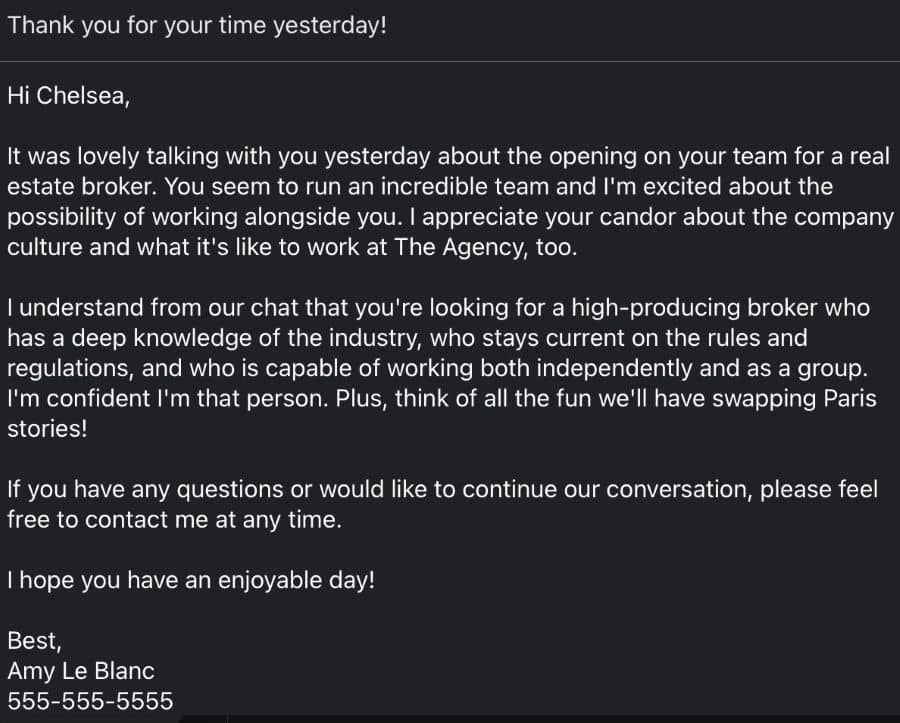
It’s simple, has a business casual tone, and is highly malleable. This is my go-to post interview thank you email.
Formal Interview
This email strives for a more reserved tone to match the position or company where you interviewed. Tactics strongly on display here are briefly recapping qualifications and starting a dialogue about next steps.
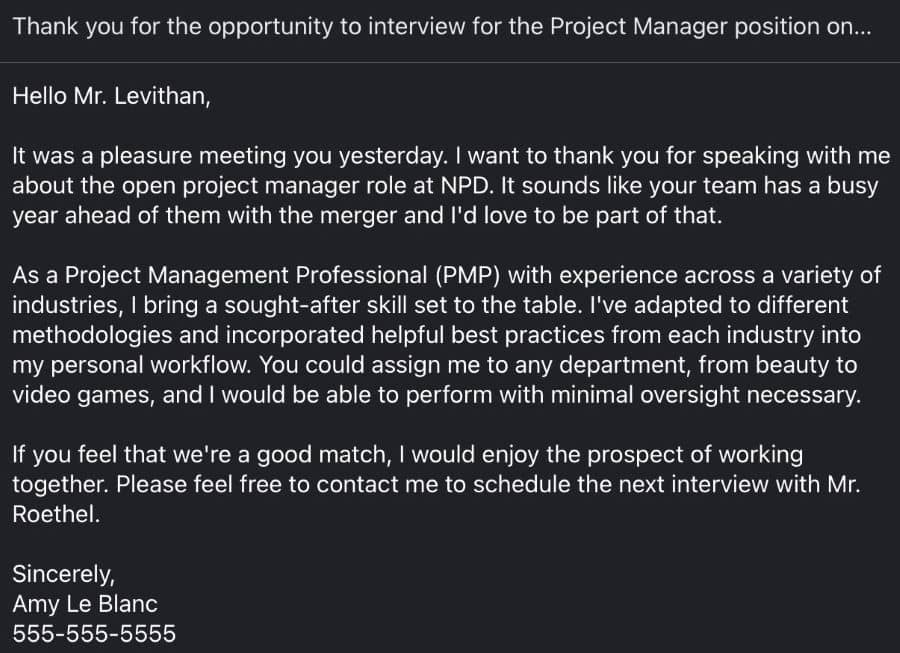
Yes, all the tactics are working here but sometimes a situation calls for stressing particular ones. You’ll find the balance that works for each situation as you write more professional thank you emails.
Internal Interview
This kind of email is great if you already have a rapport with your interviewer. Use your judgment to help you set a relaxed but still professional tone. You might not write these often but they’re fun!
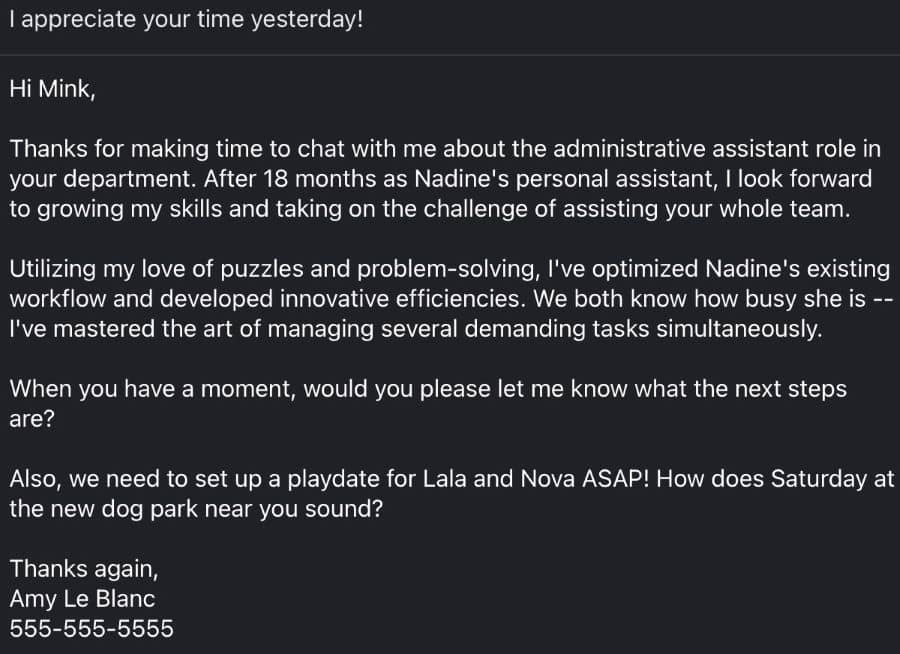
Because there’s already a relationship in this example, I could briefly recap my qualifications and mention something from the interview (puppy play date!). While I did express continued interest in the position, I didn’t make it the focus.
Second Round Interview
Every hiring process is different. If you have a second interview with the same person (or multiple people), this is a good thank you email to send.
You can demonstrate your active listening skills and give them a taste of what it would be like to work with you.
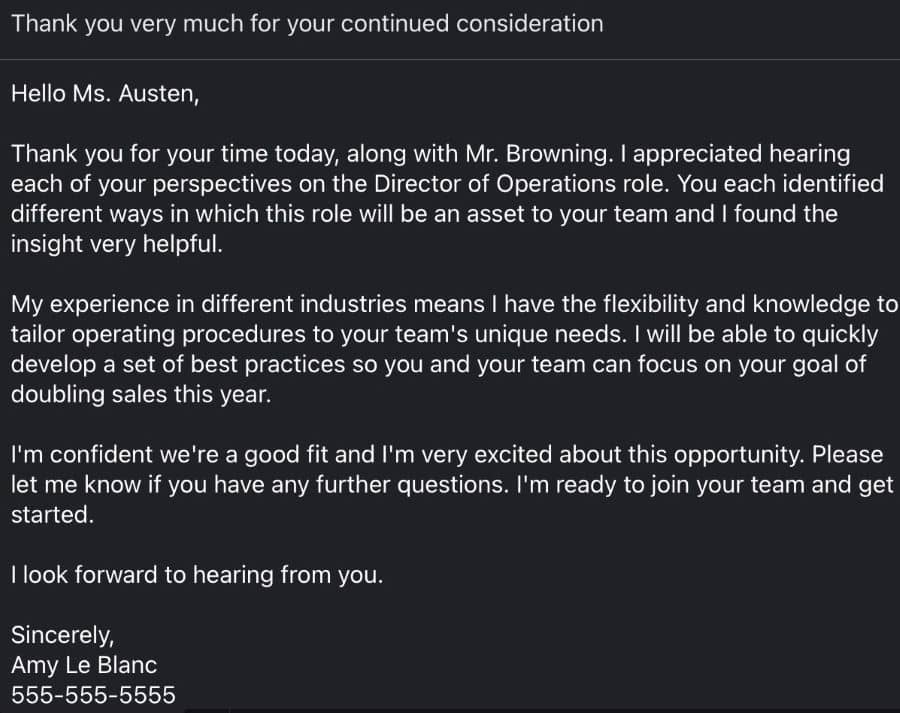
I leaned more heavily on thanking them for their time than I have in others.
And while the subject line doesn’t leave much room for creativity, the inclusion of the word “continued” will let them know at a glance that this is an ongoing conversation.
Important note: be sure to send personalized emails to each person present at a group interview!
Virtual Interview
Remote work has increased the number of companies conducting virtual interviews, like a phone interview or a video interview.
Thank you emails are important in these cases because the body language that helps shape a first impression might be diminished or absent. This is a great way to solidify their impression of you.
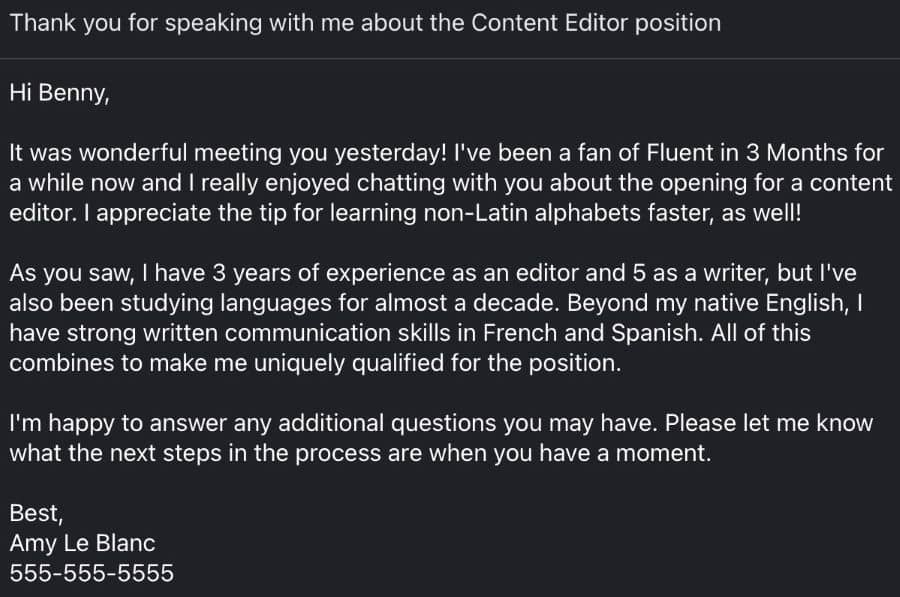
Balance is important here. I used all the tactics and didn’t give extra weight to a specific one. Things can get lost in translation when you interview over the phone or video so clarity is crucial.
Send the Perfect Thank You Email After an Interview Every Time
You’re leaving another interview, drafting your thank you email in your head as you navigate your commute.
You now know who to send an email to, how to structure it, and how to tailor it to your interviewer.
You’ll send it tomorrow, the proverbial cherry on top of the positive impression you created.
Because sending a thank you email after an interview isn’t just about gratitude.
You’re showcasing your professionalism, reinforcing your interest in the role, and setting yourself apart from other qualified candidates.
So go ahead and craft that perfect email — it could be the key to unlocking your next career opportunity!
The post How to Write a Thank You Email After Interviews (+ 5 Examples) appeared first on Smart Blogger.

No comments:
Post a Comment